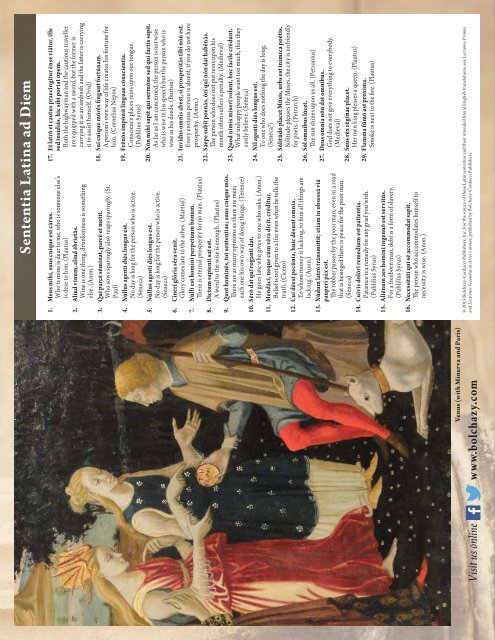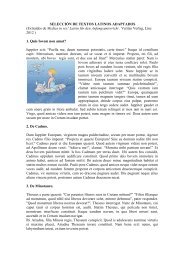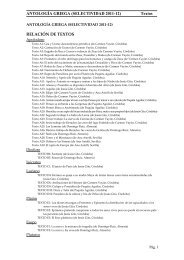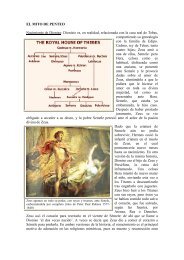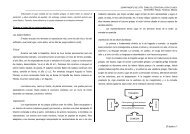www.BOLCHAZY.com
2015-2016RomanCalendar
2015-2016RomanCalendar
Create successful ePaper yourself
Turn your PDF publications into a flip-book with our unique Google optimized e-Paper software.
Visit us online<br />
<strong>www</strong>.bolchazy.<strong>com</strong><br />
Venus (with Minerva and Paris)<br />
Sententia Latina ad Diem<br />
1. Meus mihi, suus cuique est cārus.<br />
Who is mine is dear to me, who is someone else’s<br />
is dear to him. (Plautus)<br />
2. Aliud vīnum, aliud ēbrietās.<br />
Wine is one thing, drunkenness is something<br />
else. (Anon.)<br />
3. Quī parcē sēminat, parcē et metit.<br />
Who sows sparingly also reaps sparingly. (St.<br />
Paul)<br />
4. Nūllus agentī diēs longus est.<br />
No day is long for the person who is active.<br />
(Seneca)<br />
5. Nūllus agentī diēs longus est.<br />
No day is long for the person who is active.<br />
(Seneca)<br />
6. Cinerī glōria sēra venit.<br />
Glory <strong>com</strong>es late to the ashes. (Martial)<br />
7. Nūllī est hominī perpetuum bonum.<br />
There is eternal prosperity for no man. (Plautus)<br />
8. Dictum sapientī sat est.<br />
A word to the wise is enough. (Plautus)<br />
9. Quot hominēs, tot sententiae; suus cuique mōs.<br />
There are as many opinions as there are men;<br />
each one his own way of doing things. (Terence)<br />
10. Sērō dat quī rogantī dat.<br />
He gives late who gives to one who asks. (Anon.)<br />
11. Mendācī, neque cum vēra dīcit, crēditur.<br />
Belief is not given to a liar even when he tells the<br />
truth. (Cicero)<br />
12. Cui dēest pecūnia, huic dēsunt omnia.<br />
To whom money is lacking, to him all things are<br />
lacking. (Anon.)<br />
13. Nūdum latrō trānsmittit; etiam in obsessā viā<br />
pauperī pāx est.<br />
The robber passes by the poor man; even in a road<br />
that is besieged there is peace for the poor man.<br />
(Seneca)<br />
14. Cuivīs dolōrī remedium est patientia.<br />
Patience is a remedy for any grief you wish.<br />
(Publilius Syrus)<br />
15. Aliēnum aes hominī ingenuō est servitūs.<br />
For a freeborn man, debt is a form of slavery.<br />
(Publilius Syrus)<br />
16. Necessitātī quī sē ac<strong>com</strong>modat sapit.<br />
The person who ac<strong>com</strong>modates himself to<br />
necessity is wise. (Anon.)<br />
17. Et latrō et cautus praecingitur ēnse viātor, ille<br />
sed īnsidiās, hic sibi portat opem.<br />
Both the highwayman and the cautious traveller<br />
are equipped with a sword, but the former is<br />
carrying it as an ambush and the latter is carrying<br />
it to assist himself. (Ovid)<br />
18. Suī cuique mōrēs fingunt fortūnam.<br />
A person’s own way of life creates his fortune for<br />
him. (Cornelius Nepos)<br />
19. Frēnōs impōnit linguae cōnscientia.<br />
Conscience places reins upon our tongue.<br />
(Publilius Syrus)<br />
20. Nōn mihī sapit quī sermōne sed quī factīs sapit.<br />
As far as I am concerned, the person is not wise<br />
who is wise in his speech but the person who is<br />
wise in his deeds. (Burton)<br />
21. Invidus omnis abest, sī prosperitās tibi nōn est.<br />
Every envious person is absent, if you do not have<br />
prosperity. (Anon.)<br />
22. Saepe subit poenās, ōrī quī nōn dat habēnās.<br />
The person who does not put reins upon his<br />
mouth often suffers a penalty. (Medieval)<br />
23. Quod nimis miserī volunt, hoc facile crēdunt.<br />
What unhappy people want too much, this they<br />
easily believe. (Seneca)<br />
24. Nīl agentī diēs longus est.<br />
To one who does nothing the day is long.<br />
(Seneca?)<br />
25. Sōlitūdō placet Mūsīs, urbs est inimīca poētīs.<br />
Solitude pleases the Muses, the city is unfriendly<br />
for poets. (Petrarch)<br />
26. Sōl omnibus lūcet.<br />
The sun shines upon us all. (Petronius)<br />
27. Deus omnia nōn dat omnibus.<br />
God does not give everything to everybody.<br />
(Medieval)<br />
28. Suus rēx rēgīnae placet.<br />
Her own king pleases a queen. (Plautus)<br />
29. Flamma fūmō est proxima.<br />
Smoke is next to the fire. (Plautus)<br />
© 2015 Bolchazy-Carducci Publishers, Inc. For the source of these Latin sententiae and their intended literal English translations, see Lectiones Primae<br />
and Lectiones Secundae in Artes Latinae, published by Bolchazy-Carducci Publishers.


